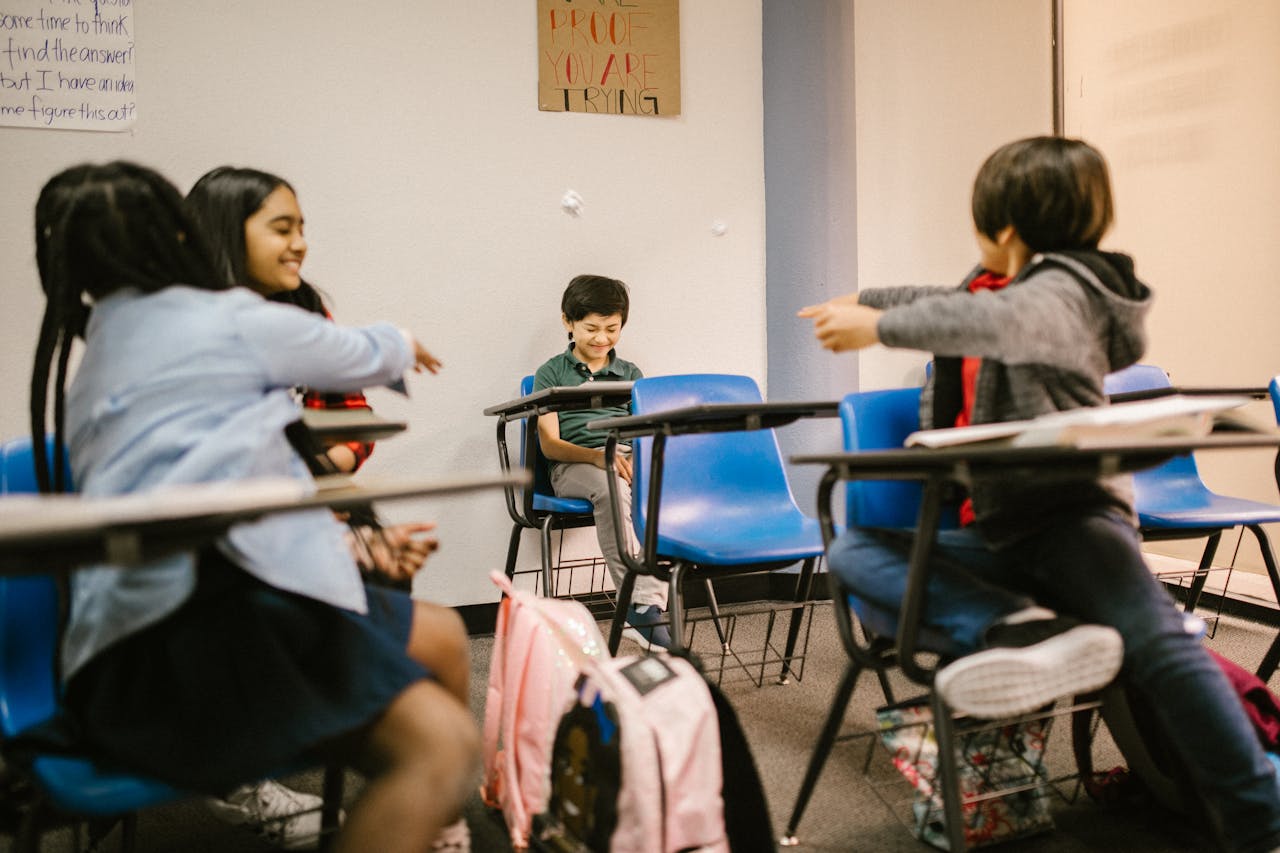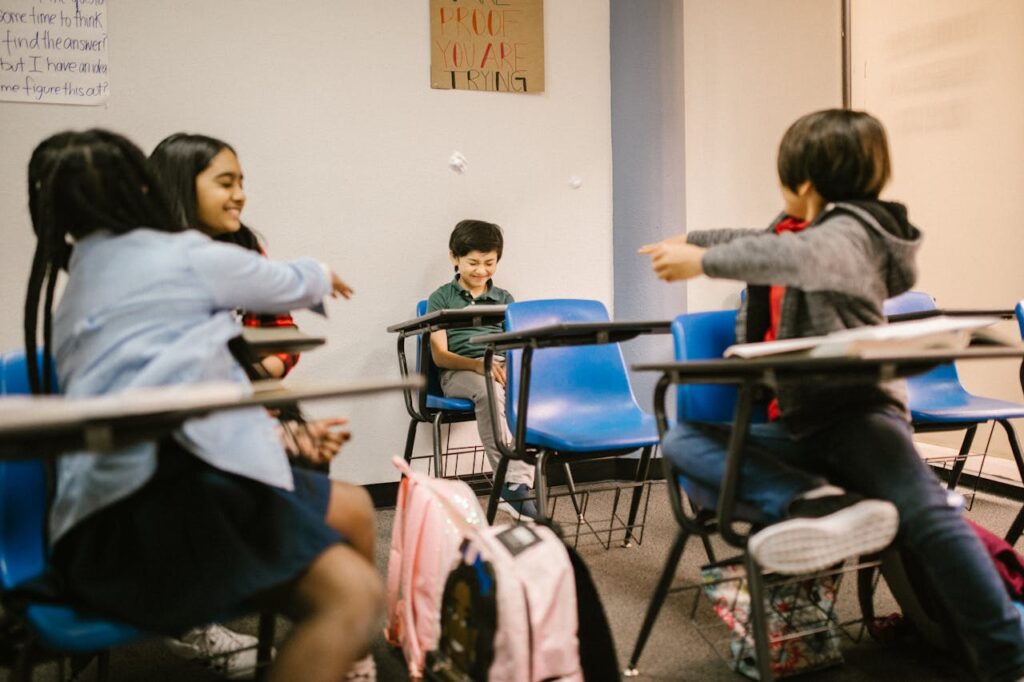Bullying, from a psychological point of view, refers to a type of aggression where an individual or a group repeatedly proactively uses aggressive actions against an individual or a group that is considered to be weaker or less powerful. This abuse can be in form of physical, verbal, emotional or social and the abuse is normally done several times. Bullying is a process where one or several students control, harm or scare other students through using power resources, physical force or information control.
How Bullying Starts
Psychosocial Factors
Family Environment: Children who have been raised in homes or surroundings that have aggressive or conflictual or low warmth are likely to grow into accepting the use of bullying as a normal way of relating with others. Likewise, erratic punishment or excessive strictness, can teach aggression.
Social Learning: Learners are known to emulate what they see in other people particularly those they consider influential or those who possess the power of the business. If they observe that the bullies are being rewarded—either in terms of a higher ranking, more attention or tangible rewards, then they too may follow in the bullies’ footsteps.

Individual Psychological Factors
Low Self-Esteem: There are those who use aggression to cover for feelings of insignificance or insignificance in some way. They may gain some form of satisfaction in exerting power over other people and this in turn increases their self-esteem for some time.
Empathy Deficits: Some of the signs of bullies include having poor ability to comprehend or even relate to how other people feel. This lack of empathy also helps them to carry out all these negative actions without feeling the pinch of conscience or regret.
Need for Power and Control: To some people especially the young ones, bullying is a way of making them feel powerful in a social setting. This need for control can be as a result of several reasons such as; Perceived lack of control in other aspects of life.
Cultural and Social Norms
Peer Influence: Bullying happens most commonly in social settings where group processes are involved. Bullying is often seen as acceptable by the peer group if they foster it and this compels the individuals in the group to engage in it as it is acceptable in the group.
Societal Attitudes: Permissive cultural attitudes to aggression, competition or dominance can foster the conditions in which bullying is likely to take place. For instance, in schools with intense competition, or communities that regard violence as a measure of power, bullying is more likely to occur.
Environmental Triggers
School Environment: Bullying usually begins in the areas that are not monitored or where the school environment does not prohibit aggressive actions. Bullying thrives where classes are large, teacher barely interfere and most importantly where there are no standard measures in place to discourage the act.
Online and Social Media: Another related aspect is that with the development of digital communication there is a new form of bullying – cyberbullying. The anonymity of social networking sites and the open accessibility of such sites make it easier for people to post material that they would not normally post when confronting another person directly.
Damaging Effects on Victims and Dangerous Consequences of Bullying
In my practice as a psychologist for many years, I have dealt with children and adolescents from different states in the United States, and I know how bullying affects the psychological health of the participants, both the bullied and the bullies. In my career I have witnessed the effects of bullying which can result in dangerous and at times, psychological effects. In my practice, I have come across a number of clients who have been bullied and they included elevated levels of depression and anxiety. Such people may also continue complaining of low mood, depression, and loss of interest in activities that used to interest them. There are several symptoms of anxiety such as excessive worrying, panic disorder and social anxiety in which the victim becomes more and more afraid of other people. Such psychological problems are disturbingly common; research that I have included show that, estimates of students who present symptoms of depression range between 20% – 30% while students who present symptoms of significant anxiety range between 15% – 25%. Other effects that I have noticed in the victims include poor self-esteem and reduced self-worth. These negative messages that they get over and over again, in the form of verbal abuse, teasing or rejection, can be devastating to their self-esteem. Some of the children and adolescents that I have worked with end up accepting the abuse by thinking that they deserve it in some way. This internalization can lead to a client experiencing a significantly low level of self-esteem which is not easy to regain in the absence of an intervention plan.
During my sessions, I get to learn a lot on how bullying affects these young ones physically. Some of my clients complain of psychosomatic disorders like headache, stomach ache, muscle pain, fatigue and other related ailments that have no known origin but are as a result of stress and psychological traumas that they undergo. These physical symptoms do not disappear even after the completion of bullying thus illustrating the effects of such incidences. Another significant problem that I have come across in practice is social isolation. Some of the bullied children isolate themselves from fellow human beings as a way of escaping from further abuse and this makes them develop loneliness. Most of them end up feeling more depressed and anxious when alone and their academic or work output is affected because they start avoiding places where bullying happens. In more severe cases, I have been assisting clients who have had PTSD due to bullying. Such experiences result in flashbacks, nightmares, severe anxiety and post-traumatic stress disorders and intrusive thoughts that are associated with bullying. Such symptoms may continued even after bullying and may hinder the affected person to carry out their normal activities. Studies and my experience suggest that only 16% of kids who are severely bullied show signs of PTSD and this is why early and efficient intervention is important. I guess one of the most worrisome outcomes that I come across in my practice is the heightened risk of suicidal ideation and attempt among bullying targets. Such feelings can make them even think of ending it and even going to the extent of attempting to commit suicide. According to CDC, children who are bullied are at a higher risk of attempting suicide and this is more than double of children who are not bullied. Unfortunately, suicide ranks third among causes of death among the young people of ten to twenty-four years in America, and therefore bullying should not be taken lightly nor left unnoticed by the youth. They have therefore supported my stand in emphasizing the need to have strong and active programs of assisting both the bulled and the bullies. The effect of bullying is not only deep-seated in one’s psychological well-being but also can be avoided if proper strategies are applied. As a psychologist, I want to make sure that people are able to recover from these kinds of experiences and become strong and be able to live a normal life.
How to Recognize If Your
Child Is Being Bullied
Bullying is a very traumatic experience for children, which can happen in school and often parents are unaware of what is happening. In my practice as a psychologist I have worked with many children and adolescents and I know the effects of bullying if it is not addressed. The parent should also ensure they pay attention to the child’s behaviors, moods and activities in the day to day lives. It is therefore important to address the issue before it gets worse and results into long term psychological effects. Here, I bring into practice some of the aspects that parents should consider to know if their child is a victim of bullying. Some of the first changes that parents are likely to observe is the change in the child’s emotional and behavioral patterns. This may also be as a result of bullying and if your child is unusually more anxious or depressed than usual.

Look for signs of over worrying and fear or even signs of panic attacks. These are usually other symptoms which are related to bullying since the child tends to develop stress and fear from being bullied. Likewise, if your child is always frustrated, sulks and avoids hobbies or events that used to be interesting to him or her, there may be a problem. Other effects that I have come across during practice include; irritability and mood swings. Such a child may easily get angry or annoyed as compared to their usual self and may be more irritable than usual. It may be seen that they are more easily offended or prone to displaying affectionate behavior and overacting when a bit annoyed. This increased irritability can also be a way of dealing with the distress they are feeling, which presents itself as mood swings that weren’t there in the first place.
A second symptom that parents should watch for is crying or temper tantrum most of the times. Bullying will make a child have a hard time trying to control his or her temper. If your child starts to cry a lot more than usual or has temper tantrums out of the blue, it may be the signs of the inner turmoil they are going through because of bullying.
Psychological symptoms are always associated with the physical symptoms that may be as a result of bullying. Watch for signs of abuse, for example, any marks that your child is likely to shy off explaining that they got them as a result of an accident. Some children would say that they are okay despite the fact they were hurt, others would find ways to rationalize their pain or cover it up out of fear or embarrassment. I have observed in my practice how bullying also leads to other related complaints that may be called psychosomatic complaint. Headaches, Stomachaches or any other form of body pains which are often reported by the child when in school or during school days may be as a result of stress resulting from bullying.
Sleep pattern alterations can also have a very large impact as well, in turn. There are also symptoms that include sleeping difficulties such as sleeping at night, nightmares and waking up at night frequently which could be due to the anxiety or fear caused by bullying. Stress is known to present itself in many forms and one of the symptoms that is evident in any child who is under a lot of stress is the sleep disturbances.
There are also social and academic signs which are also important to consider. When it becomes difficult for your child to go to school, a child may make requests to avoid going to school, or complain about school matters in a way that you have never seen from them may be signs that he or she is being bullied. They may be fleeing from the bully or the place where bullying takes place. I was able to observe that bullying kills the spirit of learning and learning activities as most of them are left with low grades, or they start showing no interest in their books at all. Forgetfulness, forgetting work, or losing interest in subjects in which they previously were interested, all could be indications of problems with concentration.
Another is social isolation that is a process of intentional or unintentional withdrawal from social interactions. If your child stops playing with friends, does not attend social functions or seems to be lonely, she or he may be bullied or teased by peers. Notice if they are excluded in activities that used to engage in, or if they have no interest in hanging out with friends anymore. Lack of interaction with other people may lead to depression and anxiety, which if not treated, will lead to the deterioration of the patient’s condition.
Others are behavioral shifts, which include alteration of eating habits, although these may not be very obvious. Huge changes in the mode of feeding is also another factor that could be attributed to bullying: this may be evidenced by loss of appetite, omission of meals, over-eating, etc. It is possible that some children can develop a habit of eating as a way of dealing with emotions while on the other hand there may be children who may loss appetite due to anxiety and depression. I have witnessed how all these changes may depict the anguish that a child may not be able to express.
Self-esteem can also be another way that we can be able to see that there is low esteem. If your child often complains of feeling worthless, incompetent or to be blamed, then the child is most probably being bullied. Such messages may get inside the head of the victim, thus reducing his or her self-esteem. Some children may develop an obsession of how they look, this may be as a result of others laughing at them or making fun of their looks. On the other hand they may not look in the mirror at all, which means that they have a lot of issues with how they see themselves. Last but not the least, do not overlook the signs of communication development in your child. Children sometimes fail to come out and tell their parents that they are being bullied but they may give certain cues or make certain remarks that maybe interpreted to mean that something is wrong. Some signs which suggest that your child is being bullied include when he says things like “I don’t want to go to school,” “I don’t have any friends,” or “Everyone hates me. ” Sometimes, the children themselves can come directly to their parents and report about the bullying. You need to make your child feel that he or she can open up about these things and that they will not be judged. Allow your child to freely speak and do not interrupt them with solutions too quickly because the child may take a little time before they are done with their emotions.
It is important to note these signs early enough in order to improve on the well being of your child. These are some of the behaviors or symptoms that if a person is showing then they should not take it lightly and should consult a doctor. If you notice that your child is becoming a victim of bullying, you need to ensure that you seek help early enough so that you can prevent these long term psychological effects from being felt by your child.
Tips for Parents to Support a Child
Who May Be Getting Bullied
I personally know the feeling that parents have when they have a hunch that their child is being bullied having been a psychologist who has worked with children and families all over the United States. Bullying is not something minor; it can cause damage to, and even potentially, change a child’s life, and personality. In my practice, I have treated a lot of patients where early intervention could have save them from developing deeper emotional wounds. Parents should be more active and there are several measures that may be really helpful in helping a child during such a bad experience.
This is one of the most crucial measures you can take: to explain a lot to your child and let him or her explain a lot. As the result of my observations, I can state that children tend to hide the fact of being bullied because they are afraid of revenge, or feel embarrassed. An important factor is to maintain the non-judgmental home environment. Do not rush in solving your child’s problems but rather listen to him or her and let them pour out the feelings. At other times, what the child really needs is someone to listen to him when he is upset or troubled. In one case I have experienced, a young patient, Alex, only came to reveal the fact that he had been bullied at school only after his mother reassured him day in day out that he could tell her anything without being judged. This in turn resulted in a more participatory method of handling the bullying by the school in consultation with the parents.

Besides, parents should be cautious for the following signs because they may also indicate that their child is being bullied. Symptoms that may be disturbing include changes in emotions and behavior, including anxiety, depression, irritability or unexplained changes in mood. In my practice, I once had a 10-year-old girl whose behavior changed and developed severe apathy to things she used to enjoy. At first they thought it was mood swing as is common with children in that early age, only to realize she was being rejected by her fellow children, which made her feel lonely and depressed. Signs which can also point to something being wrong include physical signs such as unexplained bruises or cuts, constant complaints of headaches or tummy aches and especially on school days.
Another important symptom is social isolation. There are signs that your child might be a victim of bullying – if your child starts avoiding his friends, if he wakes up dreading to go to school, or if he suddenly has poor performance at school. For example, a boy Ethan, who was previously a bright student, started to fail his classes and avoided physical activities. Some persuasion about his problems and it was found out that he was a victim of cyber bullying by fellow students, which resulted to anxiety and poor concentration in class. It was also possible because his parents and I quickly noticed such signs and stopped his development before he was too damaged for good. Another area is the strengthening of the child’s coping and psychosocial resources within him or her. With the advancements in technology and the world shifting more towards the online platform, issues such as cyber bullying have become rampant hence the need to ensure that your child knows how to handle stressful situations, peer pressure and other negative conducts on the internet. I have had an opportunity to work with several families to help these children learn skills which enables them not to use force to solve social problems or be overwhelmed by bullying.
One should involve the child’s school. Everyone in the family is a victim of bullying and thus bullying is not only a family problem but also a community problem. In most of the cases that I have dealt, resolution entailed working closely with teachers, school counselors and other school officials to guarantee that the child is safe and protected. Several studies show that the schools with effective anti-bullying policies, and the parental involvement level have low levels of bullying.
Creating a Bully-Free Society
The eradication of bullying needs the support of parents, school, and the society as a whole in order for us to see positive change. Bullying is a social problem in the United States where more than one-fourth of students in school admit to being bullied as stated by National Center for Educational Statistics. Such a high rate of prevalence clearly indicates that the issue is universal and requires a more multi-faceted perspective for the prevention and treatment. According to recent researches, one of the most effective approaches that may help reduce bullying is the fostering of empathy and emotional intelligence at the beginning of the child’s academic career. As much as teaching children about the feeling of others to prevent bullying is a noble cause, it should be noted that it goes a long way in helping in stopping bullying. In my work, I always use activities that aim at empathy enhancement in the course of therapy, with the help of role-play and discussions about feelings. Such exercises teach children to look at things from other people’s perspective and this is very important in preventing cases of bullying.

That is why it is crucial to have strict non-tolerance policies to bullying in schools and workplaces as well. When anti-bullying policies are well defined and when there are repercussions for such behaviors, coupled with training in the same for teachers, staff and the public, then there can be a very big change. There was a time when a middle school introduced a new anti-bullying program because several of its students accused their peers of bullying them. With the help of the program that was based on peer mediation and teacher training, it was possible to observe the reduction of the bullying rates for a year. Another important process is the promotion of diversity and creating the culture of togetherness by valuing diversity. For instance, a high school had a diversity week in which different cultures, as well as their representatives, exchanged stories and participated in team-building activities. Apart from enhancing the issue of Diversity and Inclusiveness, it also played a role in decreasing the cases of bullying that stemmed from race and ethnicity.
Just as important is the need to enhance the community engagement. Conducting workshops, seminars and awareness campaigns which involve parents, teachers, students and members of the society to deliberate on the issue and come up with ways of combating it can be very fruitful. Supporting children and teens in the community also requires the creation of safe havens which include after school activities or online forums that promotes healthy interaction.
Last but not the least, for victims, they should be supported as well as the bystanders should be empowered. Counseling and support services are crucial for the recovery and another important factor that can have a positive impact on the reduction of bullying is bystander intervention. One of the participants shared an example of a student who reported bullying and as a result, all the students in the school were encouraged to intervene, and this led to a positive change in the school for a long time. Therefore, understanding that everyone has the responsibility of eradicating bullying in the society means that it is everyone’s duty to fight bullying in the society. Through encouraging understanding of other people and encouraging everybody to be friendly and open about their problems, we can prevent bullying and create the atmosphere of safety and respect.
Join our community!
Here, we are prepared to help you achieve a better mental state and an improved life. Enter your email to receive important and useful information, suggestions, and materials in the field of psychology.
In case you have any other questions or require additional assistance, you can contact us at info@mindtopsychology.com. Click here to visit our homepage and choose your necessary category to gain proper knowledge about mental health.
Subscribe to Newsletter!
Learn the new trends and approaches in the field of mental health.
Subscribe to our free newsletter and you will receive the latest information and useful materials in your email!
Bullying and It’s Negative Effects on Psychological Health
Bullying, from a psychological point of view, refers to a type of aggression where an…
How Poor Leadership Ruins Employee Well-Being
From my experience as a psychologist, I can state that toxic leadership adversely affects employees…
Overcoming the Challenges of Postpartum Psychosis with Effective Strategies
Postpartum psychosis is a severe but treatable condition I have come across in my practice…
Common Signs of Binge Eating Disorder You Should Know
Binge eating disorder (BED) is a behavioral disorder that is characterized by compulsive binge eating….
Natural and Non-Medical Supplements to Help Relieve Depression
I have realized that majority of mental disorders can be treated using natural products than…
How the Brain Gets Affected by Depression
I have come across many instances where neurological problems are as a result of other…











I’m extremely inspired with your writing talents and also with the structure on your weblog. Is that this a paid subject matter or did you modify it yourself? Anyway stay up the nice quality writing, it’s rare to see a great blog like this one today!